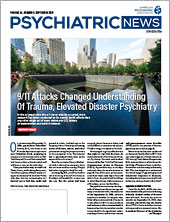Veterans with opioid use disorder (OUD) who do not receive treatment with buprenorphine are more than four times as likely to die by suicide or overdose than those who do take the medication, a study in the American Journal of Preventive Medicine has found.
Priyanka Vakkalanka, Ph.D., an assistant research scientist in the Department of Emergency Medicine at University of Iowa Hospitals and Clinics in Iowa City, and colleagues analyzed the records of more than 29,000 veterans who were diagnosed with OUD and treated with buprenorphine in the Veterans Health Administration (VHA) system between January 1, 2008, and December 31, 2017. The researchers measured a combined outcome of death by suicide and overdose, noting that they grouped suicide and overdose together because it is not always clear whether an overdose is intentional. They were able to determine from the veterans’ records whether those who died had been actively taking buprenorphine at the time of death.
Over five years of follow-up, 964 of the veterans in the study died of suicide/overdose. Among these deaths, 89.9% involved overdose (some of the deaths were documented as suicide but not overdose), and 71% of overdose deaths involved a prescription or illicit opioid. On any given day during follow-up, the risk of suicide/overdose death was 4.33 times greater in veterans with OUD who were not taking buprenorphine compared with those who were, even after accounting for those who might have been taking other medication treatment such as methadone.
“Perhaps one explanation [for this result] is that the medication works, and this work supports the growing body of literature out there about the long-term benefits of medications for OUD management,” Vakkalanka told Psychiatric News. “Additionally, maybe those who were getting pharmacotherapy treatment for OUD were also accessing other mental health services such as counseling or even primary care appointments for preventive health measures. While that was not something we investigated in this work, it might be of interest to explore how there might be different levels of health care utilization that could also be impacting long-term survival outcomes.”
The risk of suicide/overdose appeared to be greatest 8 to 14 days after treatment with buprenorphine was discontinued, but Vakkalanka said that this result should be interpreted with caution.
“It may be that the longer half-life of buprenorphine helps and that there is a sustained protective effect in the first few days,” she said.
Comorbid psychiatric conditions were common among the entire study population. More than 73% of veterans were diagnosed with depression, more than 60% were diagnosed with anxiety disorders, and more than 50% were diagnosed as having more than one substance use disorder.
“Like with the general population, OUD [among veterans] is not an isolated issue. There may be additional mental health conditions that may also need to be managed or treated along with OUD,” Vakkalanka said. “Veterans in particular may represent a unique population that has some additional challenges, including physical and mental trauma, chronic pain and injury, and higher rates of homelessness.”
Vakkalanka noted several ways of helping veterans who take buprenorphine for OUD.
“It might be important to offer counseling services, increase access and availability of treatment, and reduce any stigma associated with care management,” she said. “If a discontinuation of medication occurs, there should be good communication, support, and follow-up between the care team and the veteran. If [patients] stop treatment because of a relapse or other unplanned discontinuation, the care team should work toward re-engaging them or helping them.”
This study was supported by the National Institute on Drug Abuse, the Centers for Disease Control and Prevention/National Institute of Occupational Health and Safety, the Heartland Center for Occupational Health and Safety, and the Department of Veterans Affairs Health Care System. ■
“Association Between Buprenorphine for Opioid Use Disorder and Mortality Risk” is posted
here.

